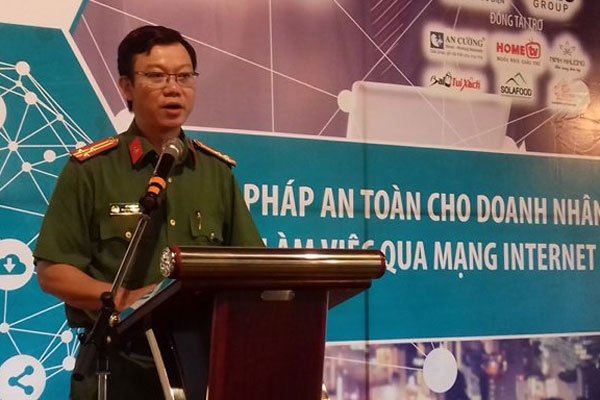More and more crimes are being committed via the internet, especially on social media, and Internet users should take caution to avoid becoming victims of these scams, said Vu Nhu Ha, chief of the HCMC Economic Police.

Vu Nhu Ha, chief of the HCMC Economic Police, speaks at a meeting last week with the 2030 Businessmen Club.
Ha mentioned three typical modi operandi taken by criminals at a meeting on “Solutions for doing business safely on the Internet” with the 2030 Businessmen Club last Thursday.
In the first modus operandi, criminals often take advantage of telecommunications. At first, they will make a phone call, informing certain subscribers that they are in debt for a huge amount beyond the subscriber’s normal telecom charges.
Soon after, the offender will pose as police, calling the subscribers to speak of a telecom scam, and require the user to provide their account details to quickly tackle the alleged cheat.
When the victim trusts the caller and provides account information, unfortunate consequences are unavoidable, Ha said.
The second way by criminals is to hack emails of businessmen frequently making transactions with foreign partners. After accessing email accounts and having a thorough understanding of transactions, the offender will create an email resembling that of their foreign partners.
For example, if the email address of the foreign partner is powerelectric@xxx, the criminal will register a similar email like powerelectrics@xxx and require victims to conduct wire transfers to another account, citing some logical reasons. Ha said many Vietnamese enterprises in such circumstances will transfer money without careful check.
As such, Ha advised enterprises to be vigilant and carefully check their partners’ emails.
Last but not least, phishing is on the rise with victims who are often single and gullible women.
Most offenders often create accounts for impersonation on social media and cheat women in their friend lists.
Specifically, criminals can impersonate U.S. war veterans whose wives had extramarital relations with other men and they would play a role of rich but lonely men. They express the desire to make a new start in Vietnam.
After gaining Vietnamese women’s trust, they will inform that these would-be victims that the women will receive a large amount of money to prepare for their life in Vietnam. But first, she must pay huge fees for customs clearance.
In a video shown at the meeting last week, a woman declared that she lost VND2.7 billion in a US$2-million scam.
Or criminals can impersonate successful businessmen from Western countries who want to invest in Vietnam and deceive gullible people.
Besides above-mentioned scams, Ha also warned businessmen to stay vigilant against two other ways often used by criminals.
In the first way, criminals will impersonate a trade promotion agency to trick Vietnamese enterprises into exporting products to another country, but the promised payment will never come.
The second is the sale of poor-quality or fake products through forged websites, resulting in losses for consumers and badly affect the enterprises’ images. These enterprises may not have opportunities to explain to their customers.
Ha advised businessmen to be careful with online transactions and inform competent agencies immediately if they detect suspicious signs.
SGT